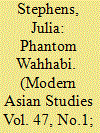|
|
|
Sort Order |
|
|
|
Items / Page
|
|
|
|
|
|
|
| Srl | Item |
| 1 |
ID:
164874


|
|
|
|
|
| Summary/Abstract |
Bombay, the hub of Britain's Indian Ocean empire, hosted a ceaseless flow of humanity: sailors and lawyers, street performers and royal refugees. When fate set obstacles in their way, the residents of this teeming metropolis petitioned colonial officials, looking on them as patriarchal providers of last resort. These petitions, which this article terms ‘personal pleas’, adeptly braided different, often contradictory, idioms of late nineteenth- and early twentieth-century imperial governance, from stylized imitations of traditional authority to bureaucratic proceduralism. Their functional contribution to Raj governance, however, remains a puzzle since the vast majority of petitions were rejected. For the British, the steady flow of rejections threatened to unmask the disjuncture between the expectations and realities of Raj paternalism. As a result, colonial officials viewed personal pleas with a mixture of ridicule and concern. Yet, while unsettling for officials, personal pleas rarely spurred the collective politics associated with anti-colonial resistance. Thus, where other articles in this special issue focus on petitioning's functional contributions to the consolidation of state bureaucracies and the formation of new publics, this article traces the genre's more emotive dimensions. Even as they failed to consolidate colonial discipline or resistance, personal pleas provided a vehicle for the airing of the lived contradictions and tensions of empire. They allowed rulers and subjects alike to fantasize about the possibility of a more benevolent order, and to vent their frustration when those fantasies crumbled in the face of imperial indifference.
|
|
|
|
|
|
|
|
|
|
|
|
|
|
|
|
| 2 |
ID:
121944


|
|
|
|
|
| Publication |
2013.
|
| Summary/Abstract |
In the late 1860s and early 1870s the British colonial government in India suppressed an imagined Wahhabi conspiracy, which it portrayed as a profound threat to imperial security. The detention and trial of Amir and Hashmadad Khan-popularly known as the Great Wahhabi Case-was the most controversial of a series of public trials of suspected Wahhabis. The government justified extra-judicial arrests and detentions as being crucial to protect the empire from anti-colonial rebels inspired by fanatical religious beliefs. The government's case against the Khan brothers, however, was exceptionally weak. Their ongoing detention sparked a sustained public debate about the balance between executive authority and the rule of law. In newspapers and pamphlets published in India and Britain, Indian journalists and Anglo-Indian lawyers argued that arbitrary police powers posed a greater threat to public security than religious fanatics. In doing so, they embraced a language of liberalism which emphasized the rule of law and asserted the role of public opinion as a check on government despotism. Debates about the Great Wahhabi Case demonstrate the ongoing contest between authoritarian and liberal strands of imperial ideology, even at the height of the panic over the intertwined threat of Indian sedition and fanatical Islam.
|
|
|
|
|
|
|
|
|
|
|
|
|
|
|
|
|
|
|
|
|